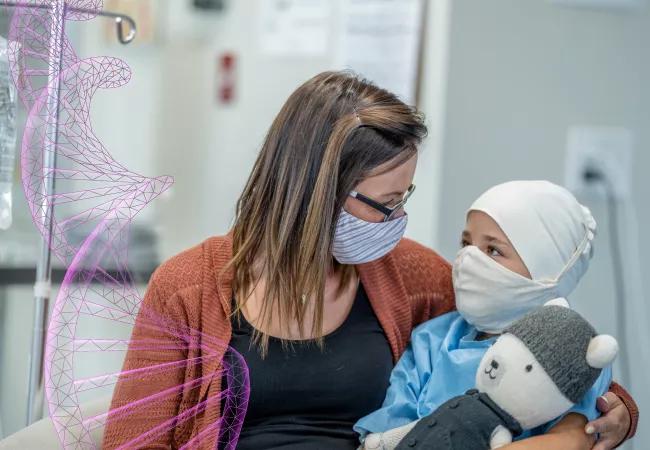Searching for new causes of familial cancer

Approximately 10%–18% of all cancers are attributable to germline mutations from cancer predisposition syndromes; however, the cause of a significant proportion of childhood-onset familial cancers remains unknown. In a new study funded by VeloSano for Kids, researchers plan to establish a registry of clinical data from patients with familial cancer and store their biological materials in Cleveland Clinic’s Genomic Medicine Biorepository for future genetic studies.
Advertisement
Cleveland Clinic is a non-profit academic medical center. Advertising on our site helps support our mission. We do not endorse non-Cleveland Clinic products or services. Policy
By identifying the faulty genes responsible for tumor formation in cancer-prone families, the group hopes to offer genetic counseling and testing for at-risk family members, learn more about recurrence risks and inform clinical management.
According to principal investigator Harry Lesmana, MD, genomics has allowed such patient registries to serve as tremendous resources for investigators. “In Cleveland Clinic Children’s Department of Hematology & Oncology, we are trying to get a better understanding of our patients’ family history and the type of cancer. In this study, we’ll store germline and/or tumor samples from patients — and possibly next-of-kin — as well demographic and clinical information so that we can interpret genomic data in an appropriate clinical context,” says Dr. Lesmana.
Then, genetic data will be extracted or analyzed to identify inherited genetic aberrations associated with familial segregation of cancer. “Genetic variants of interest will include mutations in known genes undetected by prior clinical genetic testing, coding mutations predicted to disrupt protein function and potential mutations in regulatory regions of the genome.”
Dr. Lesmana hopes to discover new genetic causes for familial cancer through high-throughput sequencing technology, including whole exome and/or whole genome sequencing and RNA sequencing.
For the purposes of this research study, familial cancer is defined as:
Advertisement
“Family studies are a powerful means for disease gene discovery because variant alleles can be excluded from further consideration if they do not segregate with an abnormal phenotype, such as cancer. We expect that for most families chosen for genetic investigation, we will need to complete genetic analysis on at least two of the affected individuals, as well as a proportion of unaffected family members,” Dr. Lesmana explains.
To date there have been more than 150 cancer predisposing genes already identified. With this study, researchers hope to discover new cancer predisposing genes. Information gained will increase the understanding of the pathways that drive tumor formation and may enable the development of novel therapies.
Advertisement
Advertisement

Combining advanced imaging with targeted therapy in prostate cancer and neuroendocrine tumors

Early results show strong clinical benefit rates

The shifting role of cell therapy and steroids in the relapsed/refractory setting

Radiation therapy helped shrink hand nodules and improve functionality

Standard of care is linked to better outcomes, but disease recurrence and other risk factors often drive alternative approaches

Phase 1 study demonstrates immune response in three quarters of patients with triple-negative breast cancer

Multidisciplinary teams bring pathological and clinical expertise

Genetic variants exist irrespective of family history or other contributing factors